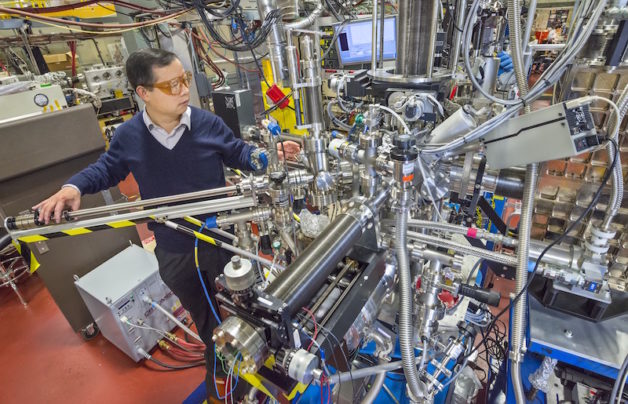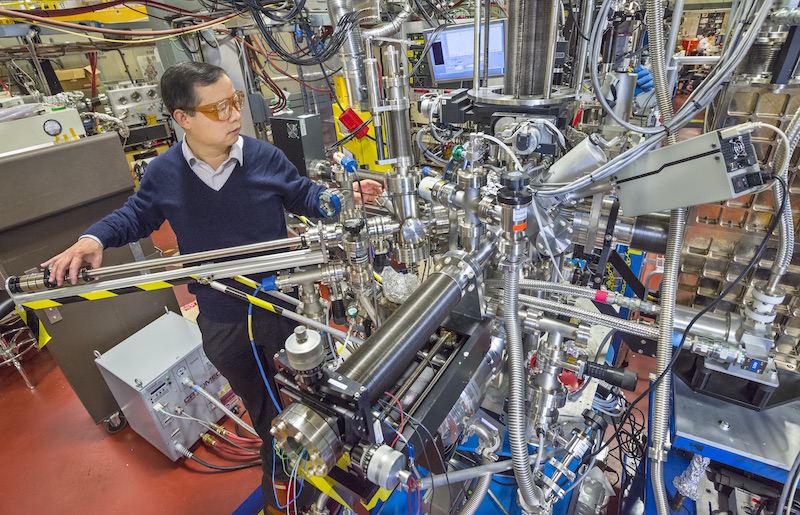Program Contact: Alecia Ward, 510-486-4540
The U.S. Department of Energy (DOE) announced that 38 small businesses will collaborate with national lab researchers through the Small Business Vouchers (SBV) pilot, including four that will work with Lawrence Berkeley National Lab (Berkeley Lab) in the areas of bioenergy and advanced manufacturing.
The innovative SBV pilot facilitates access to the DOE national labs for U.S. small businesses, enabling them to tap into the intellectual and technical resources they need to overcome critical technology challenges for their advanced energy products and gain a global competitive advantage.
Eight DOE national laboratories will receive funding to partner with 38 competitively selected small businesses across the country.

Small business will have access to the Advanced Light Source, a DOE Office of Science User Facility, through DOE’s Small Business Voucher pilot. (Credit: Roy Kaltschmidt/Berkeley Lab)
Berkeley Lab received the following awards to collaborate with small businesses:
- $300,000 to work with San Diego, California-based Astrileux Corporation towards developing extreme ultraviolet (EUV) materials that are cheaper and more durable than current EUV materials. This project will use Berkeley Lab’s Advanced Light Source (ALS) and Molecular Foundry to characterize and validate their existing EUV model, resulting in the deployment of cleaner, lower power light sources. The ALS and Molecular Foundry are DOE Office of Science User Facilities.
- $240,000 to work with Middletown, Rhode Island-based Lilac Solutions, Inc. to develop new inorganic ion exchange materials to extract lithium from brine resources. Existing ion exchange materials require large volumes of water in desert environments and only yield lithium at low concentrations. This project will partner with Berkeley Lab to help control chemical composition, phase purity, and particle size to optimize protocols for synthesis and processing with the goal of reducing water consumption by 40-fold and increasing lithium concentration by 40-fold.
- $300,000 to work with Corvallis, Oregon-based Inpria Corporation to use Berkeley Lab’s Micro Exposure Tool and Dose Calibration Tool in order to improve their highly advanced photoresists, a key component in semiconductor manufacturing. This project has the potential to reduce the power consumption by the semiconductors used in electronic devices.
- $200,000 to work with Milton, Massachusetts-based Kalion Inc. to reach full manufacturing-scale production of glucaric acid and glucuronic acid by creating a manufacturing-ready production strain and then scaling up that strain to generate an appropriate process. The availability of such a process will expand the food, pharma, and polymer applications requiring a purity of more than 99 percent. This project will use DOE’s Advanced Biofuels Process Demonstration Unit (ABPDU), a facility run by Berkeley Lab.
Partnerships with 114 U.S. Small Businesses
In the first two rounds of the program, 12 DOE national labs received funding to partner with 76 small businesses. With today’s announcement, SBV will have forged partnerships between 114 American small businesses and the national labs. A full list of SBV projects and participating DOE national labs is available at www.SBV.org.
Small businesses developing advanced technologies often need unique facilities and experts to test, develop, and validate their innovative products. DOE national labs house these capabilities, but accessing the labs can be a challenge many small businesses struggle to overcome. SBV facilitates access to the DOE national labs for qualified small businesses by making the contracting process simple, lab practices transparent, and access to the labs’ unique facilities more open.
In addition to Berkeley Lab, DOE labs participating in the new round of collaboration include Argonne National Laboratory, Idaho National Laboratory, National Renewable Energy Laboratory, Oak Ridge National Laboratory, Pacific Northwest National Laboratory, Sandia National Laboratories, and Savannah River National Laboratory.
Small Business Vouchers (SBV) is part of the Tech-to-Market Program within DOE’s Office of Energy Efficiency and Renewable Energy (EERE). Tech-to-Market is focused on strengthening the innovation ecosystem by eliminating common barriers that prevent market exploration of new energy technologies. To learn more about SBV and current projects, visit www.SBV.org.
The Energy Department’s Office of Energy Efficiency and Renewable Energy accelerates research and development of energy efficiency and renewable energy technologies and market-based solutions that strengthen U.S. energy security, environmental quality, and economic vitality.
# # #
Lawrence Berkeley National Laboratory addresses the world’s most urgent scientific challenges by advancing sustainable energy, protecting human health, creating new materials, and revealing the origin and fate of the universe. Founded in 1931, Berkeley Lab’s scientific expertise has been recognized with 13 Nobel prizes. The University of California manages Berkeley Lab for the U.S. Department of Energy’s Office of Science. For more, visit www.lbl.gov.
DOE’s Office of Science is the single largest supporter of basic research in the physical sciences in the United States, and is working to address some of the most pressing challenges of our time. For more information, please visit science.energy.gov.
